Farmer Focus: Change in winter sheep plan needs thought
 © Richard Stanton
© Richard Stanton We have finally finished lambing our hoggs here. It feels as if it has taken forever, especially after lambing them separately to the ewes.
In general it has gone pretty well. The best practice has proven to be leaving them alone as much as possible and having a system in place for catching any problem animals.
The dog and crook have been busy at times, but the hoggs and their lambs are in great shape and growing well on plantain and clover.
The main group of ewes and lambs have been bunched up into 300 ewes with lambs and are rotationally grazing 2.5ha paddocks.
See also: Read more from the Livestock Farmer Focus writers
This is helping ewe condition, lamb growth and grass quality and use. It also allows us to grow more grass, which has just been mowed for silage to be sold to a local dairy farm.
I can buy back any bales I may need for the winter as and when, which is a pretty handy arrangement and means we avoid hefty contractor bills.
See also: Pleased with lambing given the poor weather
More than half of the farm is very productive grassland and produces too much feed for 600 ewes in the summer. However, it is wet, heavy land in the winter and much of it can’t hold stock over the wetter, colder months.
I would like to expand ewe numbers as much as possible and start to budget feed more accurately. However, I need to come up with the right system for overwintering.
Current dairy wintering and turnips cost £0.50 a ewe a week, but this involves me doing a lot of electric fencing and moving of stock and still leaves us short of feed in February and March when the farmers want the land back.
Perhaps sending them away for the winter for somebody else to look after could prove a better and overall cheaper option and allow me to concentrate on the calf-rearing and gritting enterprises. It needs some serious thought.
Putting a value on our own time – spent both on and off the farm – is something us farmers aren’t particularly good at. I need to get better at this over the next 12 months, along with improving my work-life balance.
Jim Beary contract rears 900 calves a year and has a growing flock of Aberfield-cross New Zealand Romneys on a county council farm. He also runs a contract gritting enterprise in winter.
